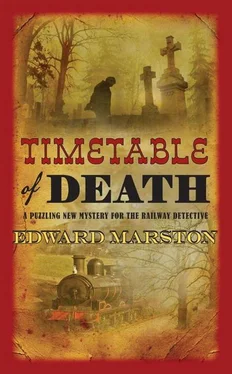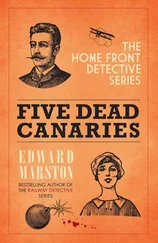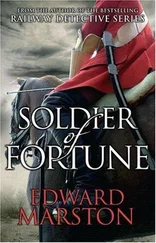Edward Marston - Timetable of Death
Здесь есть возможность читать онлайн «Edward Marston - Timetable of Death» весь текст электронной книги совершенно бесплатно (целиком полную версию без сокращений). В некоторых случаях можно слушать аудио, скачать через торрент в формате fb2 и присутствует краткое содержание. Год выпуска: 2015, ISBN: 2015, Издательство: ALLISON & BUSBY, Жанр: Исторический детектив, на английском языке. Описание произведения, (предисловие) а так же отзывы посетителей доступны на портале библиотеки ЛибКат.
- Название:Timetable of Death
- Автор:
- Издательство:ALLISON & BUSBY
- Жанр:
- Год:2015
- ISBN:9780749018122
- Рейтинг книги:4 / 5. Голосов: 1
-
Избранное:Добавить в избранное
- Отзывы:
-
Ваша оценка:
- 80
- 1
- 2
- 3
- 4
- 5
Timetable of Death: краткое содержание, описание и аннотация
Предлагаем к чтению аннотацию, описание, краткое содержание или предисловие (зависит от того, что написал сам автор книги «Timetable of Death»). Если вы не нашли необходимую информацию о книге — напишите в комментариях, мы постараемся отыскать её.
Timetable of Death — читать онлайн бесплатно полную книгу (весь текст) целиком
Ниже представлен текст книги, разбитый по страницам. Система сохранения места последней прочитанной страницы, позволяет с удобством читать онлайн бесплатно книгу «Timetable of Death», без необходимости каждый раз заново искать на чём Вы остановились. Поставьте закладку, и сможете в любой момент перейти на страницу, на которой закончили чтение.
Интервал:
Закладка:
Edward Marston
Timetable of Death
PREFACE
This is a work of fiction and I have had to bend certain facts to make them fit into the narrative. I had to create a vacancy for the post of chairman of the Midland Railway and take a few liberties with the publication of the Derby Mercury and with the policing arrangements in Spondon in 1859. At the time, St Werburgh’s church was known as St Mary’s. It was rededicated to St Werburgh in the early 1890s. When I visited the church, a wedding was taking place. By contrast, the novel begins with a funeral. The murder of Enoch Stone in 1856 was an actual event. The case remains unsolved.
CHAPTER ONE
Spondon, 1859
Perched on the top of a hill, the parish church of St Mary looked down on the people of Spondon with the fond and caring eye of a doting parent. When it was built at the end of the fourteenth century it had been an imposing Gothic structure that seemed too large and grandiose for a small Derbyshire village and, even though it now served a parish of over fifteen hundred souls, its pre-eminence, architecturally and spiritually, remained. Among its multiple functions, it was the social centre of the village, the place where the faithful gathered every Sunday in their best attire to mingle with their friends and neighbours, to exchange news, to share confidences and to develop stronger bonds.
The main topic of conversation that Sunday morning had been the untimely death of Cicely Peet, a lady of some standing in the community, cut down cruelly by disease when still short of her fiftieth birthday. As the congregation listened to the handsome tribute paid to her by the vicar during his sermon, her grave had already been dug in the churchyard and the funeral was already assured of a sizeable number of mourners. There was a pervasive mood of sadness and regret and many a handkerchief was pressed into service. When it was finally over, people came slowly out of St Mary’s to shake the hand of the Reverend Michael Sadler and mumble a few departing words before glancing involuntarily in the direction of the fine house where Mrs Peet had lived for so many years. It was a long time before everyone had dispersed.
A blanket of sorrow lay over the whole village. Respect for the dead was not, however, a universal feeling. On the very next day, it was certainly not in evidence in the behaviour of two of the younger inhabitants.
‘Aouw!’
Lizzie Grindle had pushed her younger brother and made him yelp.
‘Chase me!’
‘Don’t mank abaht,’ he complained.
‘I’m farster than ter.’
‘Gerraht!’
‘Carn’t ketch me for a penny cup o’ tea!’
To provide more encouragement, she shoved him so hard this time that he stumbled and fell to the ground. He scrambled to his feet with the intention of striking back at her but she’d already taken to her heels. Sam Grindle gave chase even though he could never outrun his sister. While she was a tall, rangy, long-legged girl of twelve, he was a short, chubby ten-year-old with a freckled face and piggy eyes. Ordinarily, he couldn’t even begin to keep up with her, but the urge for revenge gave him both additional speed and a sense of purpose. Surprisingly, he began to gain on her. Lizzie was delighted that she’d provoked a response. Tormenting her younger brother was her chief pastime and she was particularly adept at causing trouble then blaming it on him. She was far more guileful and inventively dishonest than Sam. As a result, it was the boy who, more often than not, felt the anger of his father’s hand.
The children of Walter Grindle, the blacksmith, were familiar figures in the village, always arguing, always making a noise, always darting about, always up to some kind of mischief, or so it appeared to onlookers. What they saw early on that Monday morning was a girl shrieking madly as she was pursued by a podgy lad issuing all kinds of dire threats against her. On the day before a funeral, it was unseemly. Tongues were clicked and dark looks exchanged. But they had no effect on Lizzie Grindle. She was in her element, goading her brother and pretending to be frightened of him before turning to give him a contemptuous giggle. While she ran on with the ease of a natural athlete, his legs began to tire and his lungs to burn. Sam was soon reduced to a painful plod.
Lizzie immediately changed the rules of the game. Instead of being a race that only she could win, it became an exhilarating exercise in hide-and-seek. She concealed herself in doorways, ducked under carts and disappeared behind a horse for several minutes at one point. Each time, her brother eventually found her but, before he could grab her, she was off in a flash to her next fleeting refuge. When she reached Church Hill she still had enough strength to run up it and enough devilry to stand there and mock him with rude gestures. Panting audibly and hurting badly, Sam lumbered bravely on, determined to get even with her somehow.
The churchyard offered a whole range of hiding places and Lizzie went skipping between the headstones in search of the best one. She quickly found it. The open grave of Cicely Peet beckoned. It was perfect. Her brother would never dream of looking in there. Untroubled by any thoughts of the impropriety of using someone’s last resting place as a source of childish fun, she hared across the grass and jumped happily into the grave.
It was only then that she discovered it was already occupied.
Lizzie’s Grindle’s scream of terror could be heard half a mile away.
CHAPTER TWO
The invention of the electric telegraph had been a boon to Scotland Yard. Messages that might have taken several hours to deliver by other means could now be sent in a matter of minutes. A national network was slowly being set up along the routes taken by railways and canals. Communication had therefore quickened by leaps and bounds. There was, however, an element of frustration for the recipient because the information transmitted by telegraph was often terse.
Edward Tallis voiced his usual complaint.
‘Why can’t they give us more detail?’ he asked.
‘We must accept the limitations of the service, sir,’ said Robert Colbeck, tolerantly. ‘By its very nature, a telegraph encourages abbreviation. We should be grateful for what it can do and not criticise it for being unable to send an exhaustive report of a particular crime.’ He glanced at the missive in Tallis’s hand. ‘From where did this one come?’
‘Derby.’
‘What’s the name of the victim?’
‘Mr Vivian Quayle. He was a director of the Midland Railway, hence their call for immediate assistance.’
They were in the superintendent’s office. Wreathed in cigar smoke, Tallis was seated behind his desk with the telegraph in his hand. It would have been easier to give it to Colbeck so that he could read it for himself but a deep-seated envy made Tallis draw back from that. What the inspector was not told was that there was a specific request for him to be sent. Because his record of solving crimes on the railway network was unmatched, the press had dubbed him the Railway Detective and it was a badge of honour that Tallis resented bitterly. It grieved him that Colbeck invariably collected praise that the superintendent felt should instead go to him.
Tallis was a solid man in his fifties with short grey hair and a neat moustache. His spine had a military straightness, his eyes glinted dangerously and, when roused, his rasping delivery could penetrate the walls of his office with ease. Colbeck, by contrast, was tall, slim, handsome, lithe, soft-spoken and twenty years younger. He was also something of a dandy with an elegance that Tallis thought inappropriate in one of his detectives. Since the two men could never like each other, they settled for a mutual respect of each other’s considerable virtues.
Читать дальшеИнтервал:
Закладка:
Похожие книги на «Timetable of Death»
Представляем Вашему вниманию похожие книги на «Timetable of Death» списком для выбора. Мы отобрали схожую по названию и смыслу литературу в надежде предоставить читателям больше вариантов отыскать новые, интересные, ещё непрочитанные произведения.
Обсуждение, отзывы о книге «Timetable of Death» и просто собственные мнения читателей. Оставьте ваши комментарии, напишите, что Вы думаете о произведении, его смысле или главных героях. Укажите что конкретно понравилось, а что нет, и почему Вы так считаете.












